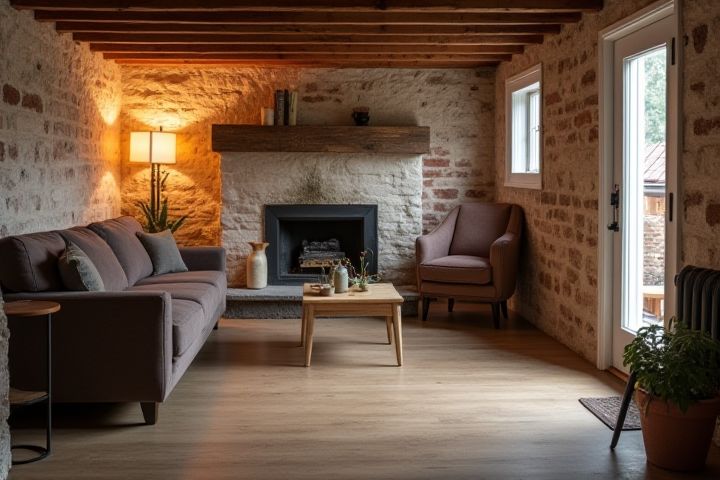
Renting out a house basement can provide a lucrative source of passive income, especially if it's equipped with essential amenities. Ensure the basement meets local building codes, including proper ventilation, egress windows, and plumbing for safety. Many tenants seek unique spaces; marketing the basement as a separate living area, complete with a kitchenette and bathroom, can attract prospective renters. Your responsibilities may include maintaining the property and ensuring compliance with landlord-tenant laws. Evaluating rental prices in your area can help determine a competitive rate to maximize profitability.
Can You Rent Out A House Basement
Local zoning regulations
Local zoning regulations often dictate the legality and conditions for renting out a house basement. In many areas, you may need to check if the basement meets specific requirements, such as minimum ceiling heights, egress windows, and separate entrances. Understanding your local laws can help ensure compliance and avoid fines; for example, some municipalities have regulations stating that a basement cannot be rented if it lacks proper ventilation or safety measures. To maximize your earnings, investigate the average rental prices for similar basement units in your neighborhood to set a competitive rate.
Building code compliance
Renting out a house basement requires strict adherence to local building codes, which ensure safety and habitability. Key factors include proper egress, which mandates emergency exits, adequate ceiling height, and sufficient ventilation to mitigate mold and moisture issues. Insulation and fire safety measures, such as smoke detectors and fire-rated walls, are also essential to comply with regulations. Before renting, consult your local housing authority to ensure your basement meets all necessary legal and safety criteria.
Separate entrance requirements
When renting out a house basement, ensuring a separate entrance is crucial for compliance with local building codes and tenant privacy. Many jurisdictions require that the entrance be directly accessible from outside the home, providing autonomy for the tenant. Installing an external staircase and a door can enhance safety and convenience, while maintaining a clear boundary between the main dwelling and the rental space. Verify local zoning regulations to guarantee your property meets all necessary legal standards for a basement rental.
Safety standards
Renting out a house basement requires adherence to critical safety standards to ensure tenant well-being. The National Fire Protection Association (NFPA) recommends installing smoke detectors in every sleeping area and on every level of the home, while carbon monoxide detectors should also be placed near sleeping spaces if you have gas-fueled appliances. Proper egress windows, which meet local building codes, are essential for safe escape routes in case of emergency, with a minimum opening area of 5.7 square feet. Ensuring that the basement is free from mold, adequate ventilation, and moisture control systems can significantly enhance tenant safety and comfort.
Egress window necessity
When renting out a house basement, an egress window is crucial for meeting safety regulations and ensuring tenant safety. Building codes often mandate that basements used as sleeping areas must have a compliant egress window, providing a safe exit in case of emergencies. Typically, the minimum dimensions for an egress window are 5.7 square feet in opening area and a height of at least 24 inches. Ensuring proper installation and compliance can also enhance your property's marketability, making it more appealing to potential renters.
Fire and carbon monoxide detectors
When renting out a house basement, it's crucial to ensure the installation of fire and carbon monoxide detectors to enhance tenant safety. The National Fire Protection Association (NFPA) recommends that smoke alarms be placed in each sleeping area and on every level of the home, including basements. For carbon monoxide detectors, they should be installed within 15 feet of sleeping areas to provide timely alerts. Compliance with local regulations may require periodic inspections, emphasizing the importance of maintaining these essential safety devices for both you and your tenants.
Rental agreement specifications
Renting out a house basement requires a detailed rental agreement that outlines the terms and conditions between you and the tenant. Key specifications should include the rental amount, payment due dates, and security deposit details to protect your interests. It's essential to specify the length of the lease, maintenance responsibilities, and terms regarding property alterations to avoid future disputes. Additionally, ensure that you comply with local housing regulations and zoning laws to guarantee the legality of your rental arrangements.
Tax implications
Renting out a basement can have significant tax implications for you as a property owner. When you generate rental income, you must report it on your tax return, potentially impacting your taxable income. Expenses related to the rental, such as repairs, utilities, and a portion of mortgage interest, can be deducted, but it's essential to keep meticulous records. Be aware of local regulations and the possibility of needing to pay self-employment tax if your rental activity is classified as a business.
Tenant privacy laws
Renting out a house basement requires a thorough understanding of tenant privacy laws, which vary significantly by region. In most jurisdictions, tenants have the right to privacy within their rented space, meaning you cannot enter the basement without providing proper notice, typically 24 to 48 hours, except in emergencies. You should also clearly outline access rights in the lease agreement, detailing situations that may require entry, such as repairs or inspections. Ensuring compliance with these laws not only protects your tenant's privacy but also fosters a respectful landlord-tenant relationship, paving the way for a smoother rental experience.
Proper ventilation systems
Renting out a house basement requires implementing proper ventilation systems to ensure a healthy living environment. High-quality ventilation not only controls humidity levels but also prevents mold growth, which can affect indoor air quality. You must consider installing exhaust fans and dehumidifiers to maintain optimal airflow, particularly in spaces with limited natural light or windows. By prioritizing these ventilation solutions, you can enhance tenant comfort and protect the structural integrity of your rental space.
